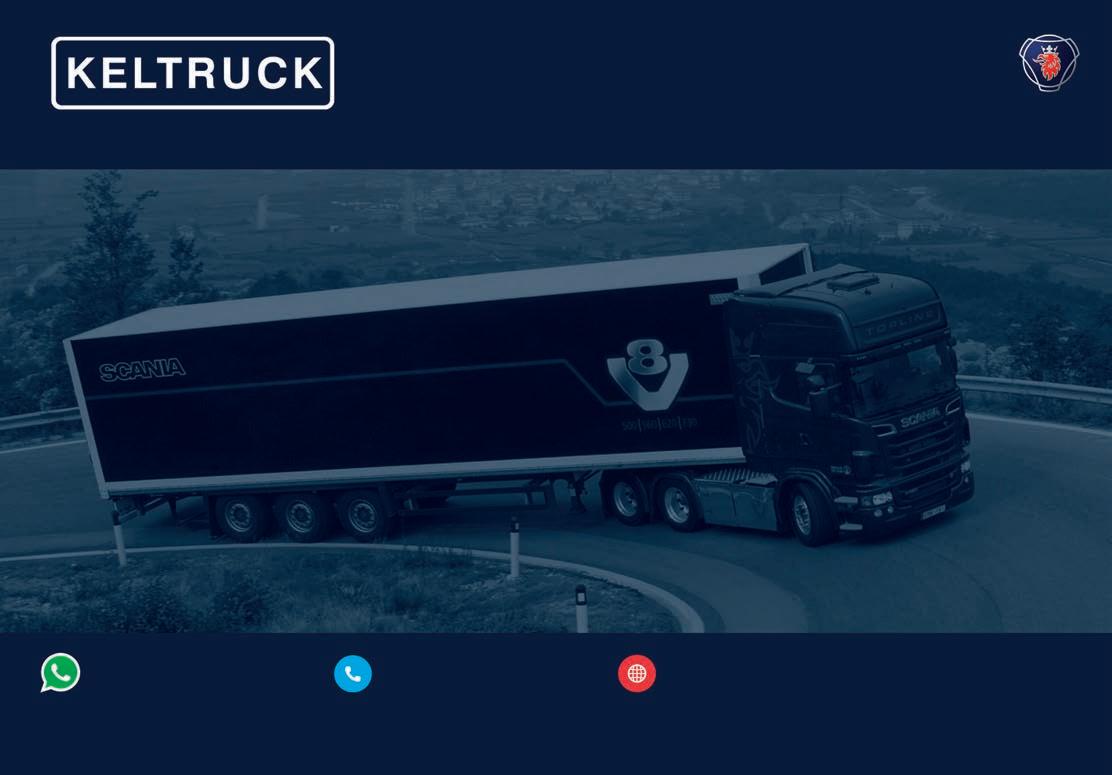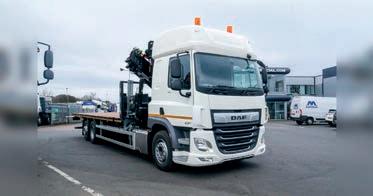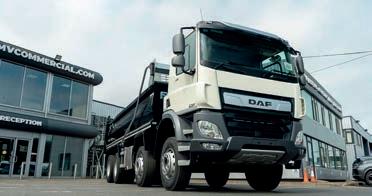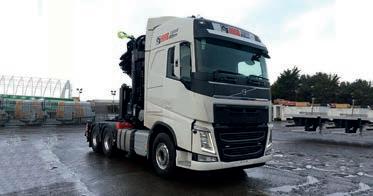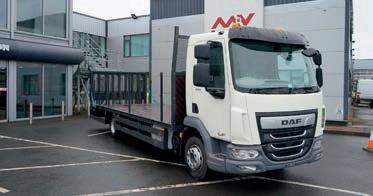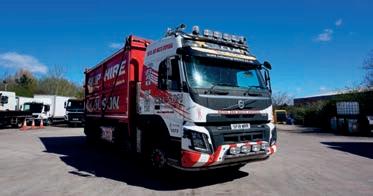
10 minute read
Carlton Forest
Step changes, quicker turns
Adam Jones laughs as he tells MT how he doubled the size of Carlton Forest 3PL in the space of 10 weeks during March and April. “It’s bonkers really!”
Advertisement
Formerly with DHL Supply Chain, he only joined the East Midlands-based logistics firm in February, but has quickly taken warehouse space to over 1 million sq ft after acquiring three new sites at Bawtry Park near Doncaster. He’s also found time to sign several major new contracts and is aiming to boost turnover from £8m to £15m in the next 12 months.
“It’s been a great success story,” he says. “For someone at Carlton’s level, it’s a huge achievement. We’ve caught people off guard. We’re attracting bigger, more corporate
Since joining East Midlands-based Carlton Forest 3PL as MD back in February, Adam Jones has vastly expanded warehousing space and signed a string of lucrative contracts. Tim Wallace gets the full story on his ambitious growth strategy

SMART MOVE: The new Bawtry Park sites were being eyed by rivals customers and people who want to work with us. It’s really exciting.
“As soon as news got out that I was coming in as MD the phone was ringing off the hook with people wanting to support me and say we could do some business. It’s ballooned, I couldn’t have asked for a better start.”
The new sites join an existing portfolio of South Yorkshire warehouses including 125,000sq ft at Hellaby and 170,000sq ft in Barnsley, plus 250,000sq ft at its base in Worksop, Nottinghamshire.
Such rapid expansion has also created new jobs and catapulted the company onto the industry radar. So who exactly are Carlton Forest 3PL, and how is all this investment being funded? And how far can such an ambitious growth strategy take it?
The story so far
A privately owned subsidiary of the Carlton Forest Group, the firm was launched in the 1970s by pig and cattle farmer John Pepper. His son Mark took over in the 1990s and turned it into a typical 3PL with services including warehousing, pick and pack, courier management and pallet networking.
Over the last 10 years, growth has accelerated to a point in 2015 where the company took the step-change of hiring a board of directors, quickly increasing turnover from £1m to £8m last year. But a different kind of skill set was needed to go further. And that’s where ➜ 34
Jones’s director-level experience at DHL, and before that Wincanton, made him ideal for the post.
He had also become frustrated by the corporate world, he says, and wanted a more flexible role in a family firm where he could really make his mark.
“I had a couple of years at Wincanton and a year-anda-half at DHL as business development director and they’re amazing companies and look after their people,” he says. “But Wincanton is driven by processes; it’s a big tanker to turn. I prefer working for smaller businesses that are a bit entrepreneurial and looking to grow. So it was great to have my first MD role 8 miles away from my house. It was a good opportunity at the right time.”
So how did DHL react when he left?
“It didn’t go down particularly well,” Jones admits. “I’d brought a different ethos to them and a bit of pace which they weren’t used to. I think they thought I was a DHL lifer. Without sounding too big headed, I could have quite easily stayed there for 20 years and not broken sweat, but that’s not me. They were shocked and didn’t want me to go. But I left on really good terms and we’re talking about working together moving forward.”
The new Bawtry sites were formerly owned by DHL, but that was purely a coincidence, Jones says. “It wasn’t me knowing about them and targeting them. We just did a local property search on how we could expand. Bawtry is a good solid site. DHL and Clipper were both looking at it and we managed to slip in there and take the majority of the campus before they did. It’s dog eat dog at the moment unfortunately. But it’s always nice to take one off a bigger company.”
ON A MISSION: New Carlton Forest MD Adam Jones says the company only has itself to blame if it doesn’t become a £50m business within five years
Service over price
The company’s focus on warehousing isn’t surprising in a market where offering the right storage space in the right location has become more important than rates. “Price is the second conversation for us,” Jones agrees. “It’s more about, can you do this? Have you got the site, and can you hit these service levels? At the moment, while space is scarce and supply chains are under pressure, it’s more about offering a stable service than knocking 10p off the price of a pallet.”
Although growth is coming mainly from warehousing, there are plans to expand the logistics side of the business. At the moment the firm runs 35 artics, but hopes to boost that to 50 by the end of the year.
“We’re doing some work for ASOS and TK Maxx which churns really quickly, so we’ve gone from a slow- to quick-moving business,” Jones continues. “The way you make money in logistics is to turn your warehouses rather than having them full but not moving. So that’s all we’ve done. We’ve changed the business model slightly and it’s had a massive impact.”
The company has flourished during the pandemic, he says, and isn’t involved in any sectors that have taken a hit. “Whether it’s because stores weren’t opening and product coming in from abroad needed to be stored somewhere, or the increase in e-commerce, we’ve grown off the back of the boom. We work closely with Wincanton and a company called Sofa Club, a large e-com company. And KP, the popcorn and nuts people.
“We’ve also just signed a deal with a global glass company and I’ve taken a contract off DHL. Three months ago we’d never have dreamed of going up against a global corporate. People are starting to sit up and take notice of us.”
Jones has also recently strengthened his senior management team by poaching Lisa Tomlinson from Victoria Plum to be head of operations. “She was the first person I thought of,” he says. “She was head of home delivery for a really good, fast-moving e-commerce business. We’ve also just hired Dave Burrows, who has experience with XPO, Clipper and DHL.”
Another way the company is turning heads is through a new deal with a social media company. “LinkedIn is massive and we’ve had great publicity off there,” Jones explains. “When I joined we only had 150 followers, now we’ve got over 600.”
Current competitors are firms like local 3PL Kammac: “We’re trying to catch them up from a revenue and infrastructure point of view. Then you’ve got XPO Logistics, then Prolog in Nottingham.
“We say we’re competitors, but the way the industry is at the moment we’re helping each other out. You’ll be surprised how often we say, ‘I’ve got an opportunity I can’t fulfil, do you want to have a look at it?’
“I strive to be someone like a Clipper or a Wincanton, but we’re at the Kammac and Prolog stage at the moment. I’d hope to bypass them in the next two to three years.”
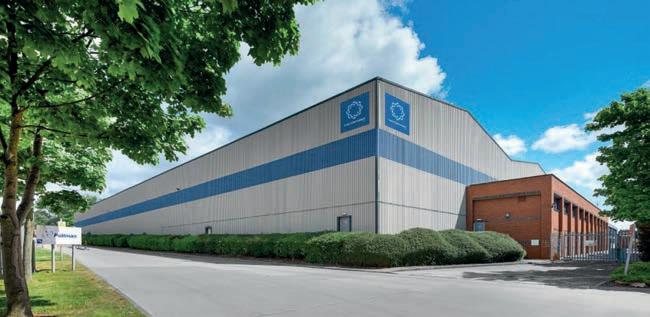
What’s in store?
Jones also has an interesting take on the irreversible surge in online shopping during the pandemic. Many firms have inevitably jumped on the bandwagon, he says, but they’ve left plenty of other business behind.
“Everybody is sprinting toward the e-commerce space and away from bulk storage or pallet-in, pallet-out,” he says. “So we’ve picked up a lot of business. People tell us these companies don’t want to store pallets now, they want to store cases. So a big percentage of our business can still grow from what we do today. If I can turn a profit by doing something nobody else wants to do, that’s fine.
“We need to mature and put systems in place to go on that ride with e-commerce. But if we can do more of what we do today and make good margin at it, why would I move away from that? We won’t just turn off our core business, it will be a natural progression.”
Although the firm is playing catch-up, Jones’s point is that he can achieve his ambition to reach £50m turnover within five years just by picking up pallet and bulk storage contracts. “You don’t have to own a fully automated superhub and do a million picks a day,” he insists. “There’s a whole industry being left behind by people running towards e-commerce that Carlton is doing a really good job of picking up.”
The company has not been badly impacted by the fallout from Brexit either. Many of its customers are UK based and purchase here. Working for a small family business has also meant extra exibility, Jones says. If anything, Brexit has made the company busier because it over-stocked to tackle some initial challenges.
So what’s next for this rapidly evolving business? “A good thing is we’re not plateauing,” Jones concludes. “We’re looking at two more sites which will add another 200,000sq ft, so we’ll be closer to 1.2 million sq ft by the end of the year. That makes us quite a large player now. We won’t be up to the DHLs and Wincantons, but we’ll be in the realms of where people start taking us seriously.
“Then we’ll sit down and start working on our one-, three- and five-year strategies. But if this company hasn’t grown into a £50m company in the next five years, something has gone wrong. If you look at the state of the supply chain, where space is at an all-time premium, there’s nothing to stop us from getting to that target. The only thing stopping us will be ourselves.” n








